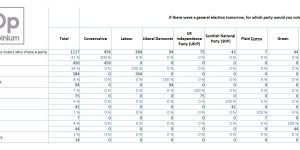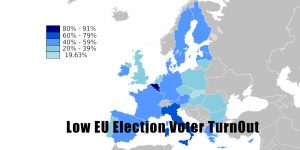The United Kingdom’s Exit from and new Partnership with the European Union White Paper
10. Ensuring the United Kingdom remains the best place for science and innovation
From space exploration to clean energy, from medical technologies to agri-tech, the UK will remain at the forefront of collective endeavours to better understand, and make better, the world in which we live. We will seek agreement to continue to collaborate with our European partners on major science, research, and technology initiatives.
Science, research and innovation at the heart of our Industrial Strategy
10.1 A global UK must be a country that looks to the future. That means being one of the best places in the world for science and innovation, leading to new products, services and better ways of doing business that are a fundamental driver of economic growth and long-term UK competitiveness.
10.2 The UK is already a leading destination for science and innovation. One of our great strengths as a nation is the breadth and depth of our academic and scientific communities, backed up by some of the world’s best universities, three of which are in the world’s top 10 and 12 in the top 100.[84] Five universities in Scotland alone are in the top 200. The UK is ranked by the World Economic Forum as one of the top six nations in the world for universityindustry collaboration in research and development.[85] In 2016, the UK was also third in the Global Innovation Index.[86]
10.3 The Government is committed to building on the UK’s world-leading science base – including more Nobel Laureates than any country outside the United States[87] – and making the UK the go-to nation for scientists, innovators and investors in technology.
10.4 This Government’s pledge to invest in research and innovation is sending a clear message that the UK is committed to protecting the UK’s strength in science.
10.5 The Autumn Statement confirmed the Government’s long term commitment to research and innovation, including through a substantial increase in government investment, worth an extra £2 billion a year by 2020/21.[88] The new Industrial Strategy Challenge Fund that this money will support will back priority technologies, such as robotics and biotechnology, where the UK has the potential to turn strengths in research into a global industrial and commercial lead.
10.6 Building Our Industrial Strategy, published on 23 January,[89] built on these announcements. It set out proposals to capitalise on the UK’s strategic strengths, and to make sure that we do more to commercialise the world-leading ideas and discoveries made in Britain. It will put the UK and our companies at the forefront of innovation, developing new products and services that address the challenges of the future.
Close engagement with the science and research base
10.7 We are engaging widely with sector representatives to ensure a smooth transition to future arrangements. For example, the Government has established a High Level Stakeholder Working Group on EU Exit, Universities, Research and Innovation, which includes a number of senior representatives of UK research and innovation funders, Higher Education Institutions, national academies and learned societies and business. This group will work with the Government to ensure that the UK builds on its strong global position in research and innovation excellence.
10.8 The Government has also taken quick and decisive action to respond to concerns of the science and research sectors, providing reassurance and certainty.
10.9 For example HM Treasury has announced that researchers should continue to bid for competitive EU research funding, such as Horizon 2020, while the UK remains a member of the EU. The Government will work with the European Commission to ensure payment when funds are awarded and HM Treasury will underwrite the payment of such awards, even when specific projects continue beyond the UK’s departure from the EU. This has given UK participants and their EU partners the certainty needed to plan ahead for projects that can run over many years.
10.10 The guarantees that HM Treasury has provided sent a clear message to UK businesses and universities that, while we remain a member of the EU, they should continue to bid for competitive EU funding.
10.11 The Government has provided further assurances by confirming that existing EU students and those starting courses in 2016-17 and 2017-18 will continue to be eligible for student loans and home fee status for the duration of their courses. We recently extended that assurance to postgraduate support through Research Council studentships, which will remain open on the current basis to EU students starting courses in the 2017-18 academic year. The funding support will cover the duration of their course, even if the course concludes after the UK has left the EU.
A global leader in international collaboration
10.12 One of the UK’s key strengths in research is international collaboration: 47.6 per cent of UK articles in 2012 were internationally co-authored – a share that has been increasing.[90] With just 3.2 per cent of global research and development expenditure, the UK accounts for 6.4 per cent of articles and 15.9 per cent of the world’s most highly-cited articles.[91] The UK also exported over £11 billion of intellectual property globally in 2015.[92]
10.13 The UK has a proud history of leading and supporting cutting-edge research and innovation within the EU. We are an active participant in Horizon 2020, the EU’s main funding instrument for collaboration on research and innovation. In addition, the UK has played a major part in developing the main EU space programmes, Galileo and Copernicus, which have supported the rapid growth of the UK space sector and contributed directly to our prosperity and security. The UK was a founding member of the European Space Agency, to which we recently committed €1.4 billion in cutting edge research and development over the next four years. The UK has also been a driving force behind European and international research on nuclear fusion.
10.14 As we exit the EU, we would welcome agreement to continue to collaborate with our European partners on major science, research and technology initiatives.
[84] ‘World University Rankings 2016-17’, Times Higher Education, September 2016.
[85] ‘The Global Competitiveness Report 2016-17’, World Economic Forum, September 2016.
[86] ‘The Global Innovation Index 2016’, The Global Innovation Index, August 2016.
[87] ‘Nobel Laureates and Country of Birth’, Nobel Prize, January 2017.
[88] ‘Autumn Statement 2016’, HM Government, November 2016.
[89] ‘Building our Industrial Strategy’, HM Government, January 2017.
[90] ‘International Comparative Performance of the UK Research Base – 2013’, Elsevier for the Department of Business, Innovation and Skills, October 2013.
[91] ‘International Comparative Performance of the UK Research Base – 2013’, Elsevier for the Department of Business, Innovation and Skills, October 2013.
[92] ONS Pink Book 2016, July 2016.
Previous : Securing New Trade Agreements with Other Countries
Next : Cooperating in the Fight Against Crime and Terrorism
The United Kingdom’s Exit from and new Partnership with the European Union White Paper












The saddest thing is that western science was kickstarted by what we learned from the arabs and the Middle-East is falling behind us.
AlGebra, AlChemy which became chemistry.
We even use the Arab numerals and counting system because its amazing. I want to see more Middle-eastern countries re-embracing the science they shared with the rest of the world.